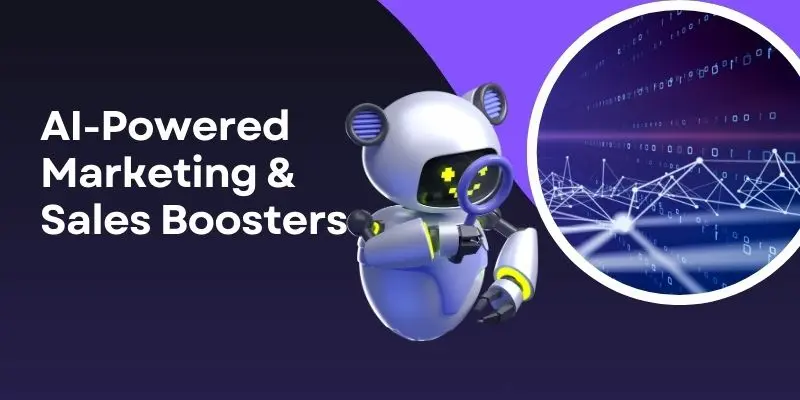Best AI Tools for Solopreneurs: 9 Must-Have Picks to Work Smarter & Grow Faster
Published: 05 Sep 2025
Running a business alone is exciting but exhausting. You juggle marketing, customer service, sales, and admin—often in the same hour. That’s where the Best AI Tools for Solopreneurs step in. These tools work round-the-clock, automate repetitive tasks, and help you achieve more with less effort. In this guide, we’ll explore the best AI tools for solopreneurs that can save time, boost productivity, and accelerate business growth.
1. Why AI is a Game-Changer for Solopreneurs
Being a solopreneur means wearing every hat in the business—CEO, marketer, accountant, and customer support—simultaneously. This can be exciting, but it’s also overwhelming. Limited time, tight budgets, and the constant need to acquire new skills often hinder growth, which is why exploring Free vs. Paid AI Tools for Startups becomes crucial in deciding how to save time, cut costs, and scale effectively.
Artificial Intelligence changes the game. Instead of trying to master every skill, solopreneurs can use AI to bridge gaps instantly. Need a marketing plan? AI can draft one in minutes. Struggling with design? AI can create professional graphics without hiring a designer. Bogged down by admin work? Automation tools can handle it while you focus on the bigger picture.

AI also enables small businesses to compete with larger companies by delivering the same level of efficiency and personalization—without needing a large team. It saves hours each week, improves decision-making with data-driven insights, and allows you to scale faster without burning out.
AI turns a one-person business into a one-person powerhouse.
2. Choosing the Right AI Tools for Your Workflow
With so many AI tools available, it’s easy to get excited and start signing up for everything. But too many tools can create chaos instead of clarity. The key is to choose AI solutions that match your actual business needs, budget, and workflow.
1. Identify your biggest challenges.
Start by listing the tasks that drain your time or energy the most. Is it scheduling? Marketing? Customer inquiries? Knowing your pain points will help you find AI tools that provide real value instead of “nice-to-have” distractions.
2. Set a clear budget.
Some AI tools are free or low-cost, while others come with monthly subscription fees. Decide how much you’re willing to invest and focus on tools that give the highest return for your money.
3. Match tools to your business goals.
If your goal is to grow your audience, choose AI-powered marketing and content creation tools. If you want to improve client experience, prioritize AI chatbots or customer service assistants.
4. Test before committing.
Many AI tools offer free trials. Use them to test the interface, features, and ease of integration with your existing systems before paying for a subscription.
5. Avoid tool overload.
One powerful tool that solves multiple problems is better than juggling five different platforms. Keep your tech stack lean and focused.
By carefully selecting the right AI tools, you’ll streamline your work, reduce costs, and avoid wasting time learning tools you don’t actually need.
3. AI for Smarter Customer Support
For solopreneurs, providing fast, helpful customer service can be one of the hardest tasks to manage alone. Every unanswered message risks losing a potential client, but constantly checking emails or chats takes valuable time away from core business activities. This is where AI-powered customer support tools step in.
1. AI Chatbots for Instant Replies
AI chatbots can handle common questions 24/7, from pricing details to product information. They can be programmed to respond in a friendly, brand-consistent tone, ensuring customers feel heard even when you’re away. Tools like Tidio, Botpress, or SupportGPT™ make setup simple without needing coding skills.
2. Automated Email & Message Responses
Instead of manually answering every inquiry, AI can filter and reply to messages based on keywords, urgency, or customer history. Platforms like HubSpot’s AI CRM or Zendesk AI can send personalized responses, direct complex questions to you, and track all interactions for future reference.
3. Virtual Assistants for Task Management
AI virtual assistants go beyond simple responses. They can schedule calls, send reminders, collect customer feedback, and even upsell or cross-sell based on previous interactions. This keeps your business responsive without you being glued to your phone or laptop.
4. Keeping the Human Touch
The key is balance. While AI can handle routine questions instantly, personal follow-ups for high-value customers help maintain trust. Combining automation for speed with human interaction for relationship-building creates the best experience.
By integrating AI into your customer support, you ensure clients always get timely, accurate, and friendly help—while freeing yourself to focus on business growth.
4. AI-Powered Marketing & Sales Boosters
Marketing and sales are the lifeblood of any solopreneur’s business, but they can also be the most time-consuming tasks.

Crafting compelling copy, running ads, and creating promotional content often require multiple skills—and that’s where AI can give you a major advantage.
1. AI Copywriting for Emails, Ads, and Websites
Instead of spending hours brainstorming taglines or sales emails, AI copywriting tools like Copy.ai, Anyword, or Jasper can generate persuasive, conversion-focused content in seconds. These platforms can adjust tone, rewrite for clarity, and even A/B test variations to see what resonates best with your audience.
2. Smarter Ad Campaign Optimization
Running ads without data-driven optimization can waste your budget. AI platforms like Madgicx or AdCreative.ai analyze performance in real-time, automatically adjusting targeting, budgets, and creatives to maximize ROI. This means you spend less money guessing and more time closing sales.
3. Content Creation for Social Media & Blogs
AI design tools such as Canva’s AI features, Visme, or FlexClip make it easy to create professional social posts, infographics, and short videos without hiring a designer. Pair them with writing assistants like ChatGPT or Notion AI to generate captions, blog outlines, and headlines that attract clicks.
4. Personalization at Scale
AI can segment your audience and personalize messages for different customer groups. For example, sending tailored offers to returning buyers while delivering educational content to new leads increases the chances of conversion.
5. Turning Data into Strategy
Tools like HubSpot AI not only track leads but also predict which prospects are most likely to buy, helping you focus your time and energy on the right opportunities.
By integrating AI into your marketing and sales process, you can reach more people, create better campaigns, and convert leads into loyal customers—without the constant grind of doing it all manually.
5. Productivity & Organization Made Simple with AI
When you’re running a business alone, staying organized isn’t optional—it’s survival. Missed deadlines, forgotten follow-ups, or chaotic schedules can quickly stall growth. AI productivity tools step in to streamline workflows, keep tasks on track, and free up mental bandwidth so you can focus on higher-value work.
1. AI Scheduling Assistants
Instead of endless back-and-forth emails to set meetings, tools like Calendly or Reclaim AI automate scheduling based on your availability. They sync with your calendar, avoid double-booking, and even suggest optimal meeting times across time zones.
2. Task Automation Apps
Repetitive admin work eats up valuable hours. Platforms like Zapier or n8n connect your apps and automate tasks in the background—whether that’s sending invoices, updating spreadsheets, or posting on social media. You set the rules once, and the system runs without supervision.
3. Smart Project Management Tools
For bigger projects, AI-powered platforms like Notion AI, Trello with AI add-ons, or ClickUp AI can create task lists, summarize meeting notes, set reminders, and flag bottlenecks. This keeps you organized without spending half your day on planning.
4. Intelligent Prioritization
Some tools go beyond to-do lists and actually recommend which tasks to tackle first based on deadlines, importance, or workload balance—helping you avoid burnout while still hitting your goals.
5. Time Tracking & Focus Enhancement
AI time trackers like RescueTime or Clockwise analyze how you spend your day and offer suggestions to reduce distractions and improve productivity.
By combining scheduling, automation, and project management into your daily routine, AI helps you run your one-person business like a well-oiled machine—without drowning in busywork.
6. AI for Content Creation & Design
For solopreneurs, creating eye-catching content can be one of the most time-consuming parts of running a business—especially if design isn’t your strength. Hiring professional designers isn’t always budget-friendly, but AI tools now make it possible to create high-quality visuals and videos without technical skills.
1. Social Media Graphics Made Easy
Tools like Canva’s Magic Design and Visme can turn a simple idea into professional social media posts in minutes. Just input your text, choose a style, and the AI generates multiple layouts and color schemes that match your brand.
2. Video Creation in Minutes
AI-powered video platforms such as FlexClip, Pictory, or InVideo allow you to produce short videos, explainer animations, or promotional clips with drag-and-drop simplicity. Many offer stock footage, auto-captions, and AI voiceovers so you can create polished content quickly.
3. Infographics and Data Visuals
If you need to explain complex information, AI tools like Piktochart or Venngage AI can transform raw data into beautiful, easy-to-read infographics—perfect for blog posts, reports, and presentations.
4. Consistent Branding Without a Designer
Platforms like Looka or Brandmark AI generate complete brand kits—logos, color palettes, and typography—that you can use across all your content for a cohesive look.
5. Content Repurposing
AI can also help you stretch your content further. Tools like Lumen5 can turn blog posts into videos, while Repurpose.io can automatically adapt content for different social platforms.
By integrating AI design tools into your workflow, you can produce professional-grade visuals that attract attention, strengthen your brand, and engage your audience—without the cost or delay of outsourcing.
7. Streamlining Finances & Admin with AI
For many solopreneurs, financial management and admin work are the least exciting—but most essential—parts of running a business. Late invoices, messy records, or poor cash flow tracking can quickly cause headaches. AI-powered finance and admin tools remove much of the manual effort, letting you stay on top of money matters without hiring an accountant or assistant.
1. Automated Bookkeeping
Tools like Dext or QuickBooks AI automatically scan receipts, categorize expenses, and reconcile accounts. This not only saves hours but also reduces errors that can happen when entering data manually.
2. Smart Invoicing & Payment Tracking
Platforms such as HoneyBook and FreshBooks AI allow you to create professional invoices in minutes, send payment reminders automatically, and track overdue bills without awkward follow-ups.
3. Payment Processing Simplified
AI-enhanced payment platforms like Stripe or Square help you accept multiple payment methods, detect fraudulent transactions, and provide real-time sales analytics—all in one dashboard.
4. Financial Planning & Forecasting
AI tools like Fathom or LivePlan analyze your income and expenses to create accurate cash flow forecasts and budget recommendations. This helps you make smarter spending decisions and prepare for growth.
5. Document & Contract Management
Administrative tasks like contract creation can also be automated. Tools such as DocuSign with AI suggest contract terms, check for errors, and track signatures—all without needing to draft from scratch.
By using AI to handle bookkeeping, payments, and admin work, you free up more time to focus on growing your business—while ensuring your financial foundation is rock solid.
8. AI for Learning, Research & Idea Generation
In a fast-changing business world, solopreneurs need to keep learning, spotting opportunities, and adapting quickly.

The challenge is finding the time to research trends, study competitors, and brainstorm new ideas while running the day-to-day. AI can handle much of this heavy lifting, delivering insights in minutes instead of weeks.
1. Brainstorming New Product or Service Ideas
AI tools like ChatGPT, Notion AI, or Gemini can generate lists of product ideas, unique service offerings, or niche opportunities based on your target audience and industry trends. You can refine these suggestions to match your business style and capabilities.
2. Conducting Market Research
Platforms such as Semrush, Similarweb, or Exploding Topics use AI to analyze market data, track emerging trends, and reveal where demand is growing. This information helps you decide where to invest time and resources for maximum impact.
3. Competitor Analysis Made Simple
AI-powered research tools like Crayon or Kompyte track your competitors’ marketing campaigns, pricing changes, and content strategies—giving you a clear view of what’s working in your industry.
4. Audience Insights & Personalization
AI can study customer behavior to uncover what they want most. For example, HubSpot AI or Zoho Analytics can segment customers based on behavior patterns and recommend tailored offers or content.
5. Continuous Learning
AI platforms like Perplexity AI or Elicit can summarize complex research papers, articles, or industry reports into simple, actionable takeaways—helping you stay informed without spending hours reading.
By using AI for research and ideation, you gain the power to spot opportunities faster, make data-driven decisions, and keep your business ahead of the curve—all while saving valuable time.
9. Integrating AI Seamlessly into Your Business
Adopting AI isn’t about replacing everything you do—it’s about enhancing your workflow and freeing up time for what matters most. Many solopreneurs make the mistake of trying to implement too many tools at once, leading to confusion and wasted resources. A gradual, strategic approach ensures AI becomes a natural part of your business rather than an overwhelming add-on.
1. Start with One Core Problem
Pick a single area that’s causing the most friction—such as customer service, marketing, or bookkeeping—and introduce an AI solution there first. This gives you time to learn the tool and measure its impact before expanding.
2. Choose Tools That Integrate Well
Your AI tools should work together, not operate in silos. For example, integrating a scheduling tool like Calendly with a CRM like HubSpot AI ensures client bookings automatically update in your records.
3. Test and Measure Impact
Track metrics like time saved, increased sales, or reduced errors after implementing a tool. If it’s not delivering tangible results, consider replacing it with something better suited to your workflow.
4. Keep the Human Touch
AI should handle repetitive or technical work, but personal engagement remains crucial—especially in a solo business where relationships are everything. Use AI to enhance communication, not replace it entirely.
5. Review Regularly and Scale Up
AI technology evolves quickly. Revisit your tech stack every few months to see if new tools can replace older ones, offer better integrations, or save more time.
By introducing AI gradually, ensuring tool compatibility, and keeping your business goals at the center, you’ll create a streamlined, efficient operation that’s ready to grow—without sacrificing quality or connection.
Conclusion
AI is no longer a luxury—it’s a powerful ally for solopreneurs aiming to work smarter, not harder. By choosing the Best AI Tools for Solopreneurs, integrating them thoughtfully, and focusing on areas where they can make the biggest difference, you can overcome skill gaps, automate repetitive tasks, and scale your business faster than ever before. The key is to treat AI as a partner in your success, helping you stay agile, creative, and ahead of the competition. Your one-person business can achieve big results—with the best AI tools for solopreneurs by your side.
FAQs
The “best” tool depends on your business needs, but HubSpot AI is often a top choice for small business owners. It offers an AI-powered CRM that automates customer follow-ups, segments audiences, and tracks sales pipelines with minimal effort. Paired with built-in marketing tools, it helps small teams—or even solo founders—maintain a professional edge without hiring extra staff. However, for creative-heavy businesses, tools like Canva AI or Jasper may be better suited for marketing content. Always start with a trial to ensure the tool integrates well with your workflow.
If you’re looking to develop a detailed business plan quickly, LivePlan with AI assistance is an excellent option. It helps you map out your financial projections, market strategies, and growth forecasts in a professional format. AI-driven prompts guide you through each section, so you don’t miss critical details like customer personas or competitor analysis. Alternatively, ChatGPT can help you brainstorm and draft ideas, while tools like Grammarly refine your writing. The key is combining a structured platform like LivePlan with a flexible AI assistant for the best results.
For investors, AlphaSense stands out as it uses AI to analyze financial documents, earnings calls, and market reports to uncover investment opportunities. It filters vast amounts of data into concise, actionable insights, saving hours of manual research. Another solid option is Koyfin, which blends AI analytics with powerful charting tools to track stocks, sectors, and market trends. These platforms are particularly valuable for those who need quick access to reliable financial intelligence before making decisions.
While AI can’t replace real human connection, tools like Replika provide friendly, empathetic conversations that feel natural. It learns your preferences and adapts to your personality over time, creating a comforting, interactive experience. People use it to share daily thoughts, practice languages, or even role-play scenarios. Some also turn to Character.AI for more varied, playful interactions with AI personas. Just remember that while AI can be supportive, it’s best used as a supplement to—not a substitute for—human relationships.
Yes. AI chatbots like Tidio or SupportGPT allow you to answer common customer questions instantly, even outside of business hours. These platforms can connect to your website, social media, or email, ensuring consistent responses. Advanced bots can escalate complex queries to you directly, so customers still feel a human touch when needed. By automating initial inquiries, you save time while maintaining high service quality.
If you want to automate posting and content ideas, Buffer and Anyword are strong choices. Buffer schedules posts across multiple platforms, while Anyword uses AI to craft high-converting captions and ad copy. Pairing them ensures you have both strategic timing and engaging content. For more visual businesses, integrating Canva AI helps create branded graphics that are ready to post.
Dext and QuickBooks AI are highly effective for automating expense tracking, categorizing receipts, and generating reports. They reduce manual errors and help keep your records tax-ready year-round. For invoicing, FreshBooks AI streamlines sending bills, tracking payments, and sending reminders automatically. These tools help solopreneurs focus on revenue-generating tasks instead of spreadsheets.
AI video creation platforms like FlexClip, Pictory, and Gan.AI make it easy to produce promotional videos without advanced editing skills. You can start with templates, add your script, and let the AI generate visuals, transitions, and even background music. This speeds up production and ensures professional-quality videos for ads, tutorials, or social media.
Most reputable AI platforms use encryption and follow strict privacy policies to protect customer data. However, it’s your responsibility to choose tools that comply with relevant laws such as GDPR or CCPA. Always check the provider’s privacy statement, limit sensitive data sharing, and consider anonymizing personal details when possible.
AI can automate many roles—like marketing, admin, design, and research—but it can’t replace the strategic thinking, creativity, and emotional intelligence of a human. The most successful solopreneurs use AI as an extension of themselves, not as a total substitute. This balance ensures your business remains efficient while retaining a personal brand identity that AI alone can’t replicate.

- Be Respectful
- Stay Relevant
- Stay Positive
- True Feedback
- Encourage Discussion
- Avoid Spamming
- No Fake News
- Don't Copy-Paste
- No Personal Attacks

- Be Respectful
- Stay Relevant
- Stay Positive
- True Feedback
- Encourage Discussion
- Avoid Spamming
- No Fake News
- Don't Copy-Paste
- No Personal Attacks





